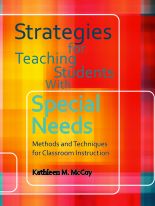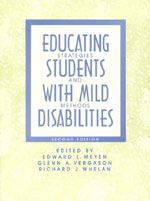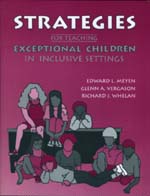Edward L. Meyen, University of Kansas
Glenn A. Vergason, Georgia State University
Richard J. Whelan, University of Kansas-Medical Center
This highly practical book translates research into classroom practice. You'll find new ideas to help teachers develop effective instructional strategies, including curriculum, assessment, classroom management, and collaboration.
Designed for both general education students and those preparing to be special educators, the text will help teachers to work with special needs students in the inclusive classroom.
Special Features
- Empirically based instructional strategies for effective teaching
- Provides procedures for conflict resolution and classroom control
- Covers the relationship between consultation and collaborative problem solving
- Addresses all of the cutting edge assessment issues
- Discusses strategies for teaching thinking skills to students with mild disabilities
- Examines new approaches to inclusion
Contents
Part One: Curriculum and Instruction
1. Curriculum Considerations in an Inclusive Environment
2. A Focus on Curriculum Design: When Children Fail
3. Standards for All American Students
4. Curriculum-Based Collaboration
5. Considerations in Teaching Higher Order Thinking Skills to Students with Mild Disabilities
6. Searching for Validated Inclusive Practices: A Review of the Literature
7. Co-Teaching: Guidelines for Creating Effective Practices
Part Two: Assessment
8. Classification and Dynamic Assessment of Children with Learning Disabilities
9. Performance Assessment and Special Education: Practices and Prospects
10. Curriculum-Based Measurement and Problem-Solving Assessment: Basic Procedures and Outcomes
11. Current Dimensions of Technology-Based Assessment in Special Education
12. Portfolio Assessment and Special Education Students
Part Three: Classroom Management
13. Peacemakers: Teaching Students to Resolve Their Own and Schoolmates' Conflicts
14. Constructive Classroom Management
15. Discipline in Special Education and General Education Settings
16. Classroom Influences on Aggressive and Disruptive Behaviors of Students with Emotional and Behavioral Disorders
Part Four: Collaboration
17. Practical Questions About Collaboration Between General and Special Educators
18. A Collaborative Model for Students with Mild Disabilities in Middle Schools
19. The General Education Collaboration Model: A Model for Successful Mainstreaming
20. Rethinking the Relationship Between Consultation and Collaborative Problem-Solving
480 pages
1996/paperback/ISBN 978-0-89108-244-6
$54.00 |





